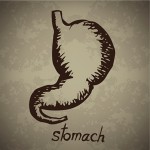Upper abdominal pain: Causes, symptoms, and treatments
 What is upper abdominal pain?
What is upper abdominal pain?
Upper abdominal pain is pain that is experienced in the esophagus or stomach. There are many reasons for upper abdominal pain varying in severity. For some, upper abdominal pain is temporary and a rare occasion. For others, it is a chronic experience that can disrupt their daily life. Narrowing down on your upper abdominal pain can help you get a proper diagnosis and receive the proper treatment for reducing your discomfort.
Stomach pain in general is one of the most common reasons for a person to visit their doctor. Upper abdominal pain may be a direct result of a stomach condition, or it can be a symptom of a problem in another organ in the body. It’s important to pay close attention to your upper abdominal pain to understand the underlying cause. For example, you should take note of when upper abdominal pain occurs (after a meal, when you are hungry), its frequency, intensity, and any other symptoms that may accompany your upper abdominal pain.
Causes of upper abdomen pain
Common causes of upper abdomen pain may stem from problems in the gallbladder or liver. This includes gallstones, hepatitis, or liver abscess. Generalized upper abdomen pain may be a result of inflammation or infection.
If the pain originates from the stomach or esophagus, it may be due to heartburn, gastroesophageal reflux disease (GERD), or a hiatal hernia.
Gastritis, a condition that causes stomach lining inflammation often due to virus or bacteria, can lead to upper abdomen pain, too. Lastly, ulcers and food allergies or intolerances can contribute to upper abdomen pain as well.
To determine the exact cause of upper abdomen pain, it’s important to take note of alternative symptoms you may experience. You can find what to look out for further down in this article.
Causes of upper middle abdominal pain
 You may experience upper-middle abdominal pain, which is primarily the stomach and all that surrounds it. Causes for upper-middle abdominal pain are quite similar to upper abdomen pain, with a few additions:
You may experience upper-middle abdominal pain, which is primarily the stomach and all that surrounds it. Causes for upper-middle abdominal pain are quite similar to upper abdomen pain, with a few additions:
- Gastroparesis – a condition in which the stomach empties slowly as a result of inadequate muscle relaxation due to damaged nerves, hormonal disorders, psychological reasons, etc.
- Peptic ulcer – an open sore along the stomach lining or the duodenum
- Stomach cancer
- Pancreatic disorders – inflamed pancreas, chronic pancreatitis, pancreatic cancer
- Muscle tear
- Intestinal hernia
- Spinal disorders – herniated disc, broken vertebra
- Aneurysm or dissention of the abdominal aorta – the aorta wall becomes weaker with age, and may bulge as a result. If burst, it can lead to an aneurysm or splitting (dissention)
- Heart attack
- Lymphoma
Symptoms that might come with upper abdominal pain
Symptoms that may accompany your upper abdominal pain due to a digestive issue include:
- Abdominal cramping or swelling
- Bloating
- Belching
- Bloody stool
- Changes in bowel movements
- Constipation
- Diarrhea
- Gas
- Indigestion
- Nausea without vomiting
If your upper abdominal pain is due to another condition, corresponding symptoms may include:
- Body aches
- Cough
- Enlarged liver and glands
- Fever
- General feeling of malaise
- Muscle spasms
- Pain, numbness, or tingling
- Rash
- Unexpected weight loss
Symptoms associated with a life-threatening condition are:
- Change in consciousness or alertness
- Chest pain, tightness in chest
- High fever
- Heart palpitations
- Inability to have a bowel movement
- Rapid heart rate
- Breathing problems – shortness of breath, rapid breathing
- Rigidity of the abdomen
- Severe and sharp abdomen pain
- Trauma to the abdomen
- Vomiting blood, rectal bleeding, or blood stool
Treatment and prevention of upper abdominal pain
 Treatment for upper abdominal pain depends on the underlying cause. This includes avoiding triggers foods, treating heartburn, treating gallstones or liver problems, and essentially treating whatever is the root of your pain.
Treatment for upper abdominal pain depends on the underlying cause. This includes avoiding triggers foods, treating heartburn, treating gallstones or liver problems, and essentially treating whatever is the root of your pain.
Pinpointing exact prevention tips for upper abdomen pain is difficult as there are so many different causes of the pain. General preventative recommendations listed below may help lower your risk of experiencing upper abdomen pain.
- Eating a healthy diet
- Drinking water regularly
- Exercising regularly
- Eating smaller meals
If your upper abdomen pain results from inflammatory bowel disease or irritable bowel syndrome, ensure you are following your treatment plan and recommended diet to minimize flare-ups.
You will also want to avoid lying down immediately after a meal to reduce heartburn and indigestion.
When to see the doctor for abdominal pain
If upper abdomen pain is mild and infrequent, you may not need to see a doctor. But if pain becomes chronic, severe, or sharp, you should definitely seek out medical advice.
You should also seek medical assistance if you notice the following:
- Blood stool
- High fever
- Vomiting blood
- Persistent nausea or vomiting
- Yellowing of the skin or eyes
- Swelling or severe tenderness of the abdomen
- Difficulty breathing
- Pain that lasts over 24 hours
- Prolonged constipation
- Burning sensation while urinating
- Loss of appetite
- Unexplained weight loss
These symptoms could indicate a more serious condition, so you should see your doctor immediately.
-
Four Mistakes loser diet weight loss Summary
We think we know what to eat: less red meat and more fibre, less sa
-
A Diet That Works Isnt That What We Are All Looking For Hurry Up
Some of us need to lose more than others, but I think most of you woul
-
Lose Weight For Life Following These Easy Steps
Many people don’t like to talk about losing weight since i
-
Black stool causes, symptoms, and treatments
Black stool can result from dietary changes to even revealing a
-
Healthy Weight Loss Tips For Women 5 Ways To Staying Slim
So congratulations! Youve lost some weight! Now, how do you keep it of
-
Excercise For Overweight Children
On reason fat camps are so effective in helping overweight children is
- DON'T MISS
- How To Burn Off Belly Fat
- Develop The Physique You Dream About With These Fitness Tips
- Is Slimming Stopping You From Losing Weight
- Piloting Your Way through Pilates
- Diets To Reduce Stomach Fat
- 5 Ways To Lose Belly Fat Without Pills, Potions or Surgery
- Discover How To Overcome External Barriers To Weight Loss
- Crude Oil Vs. Alternative Energy: Which Is Really Better?
- Green Tea - Just One Of The Many Natural Ways To Lose Weight
- Using Stevia to lose weight – Trim Off Fat With This Organic Sweetener




